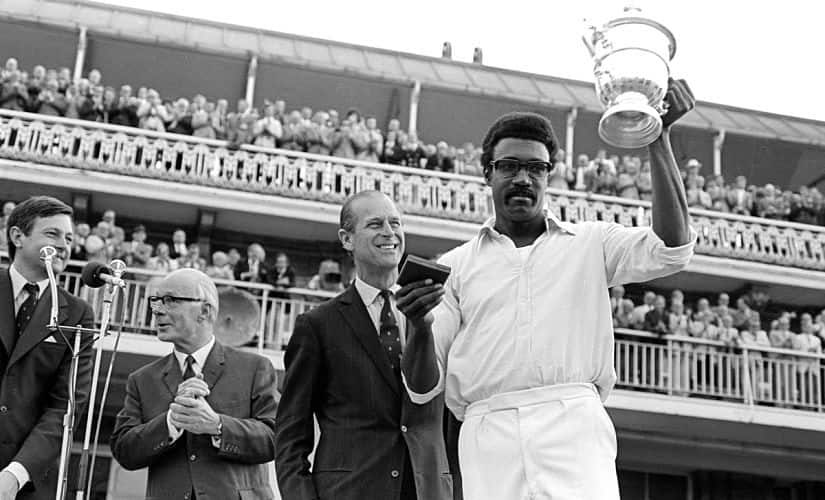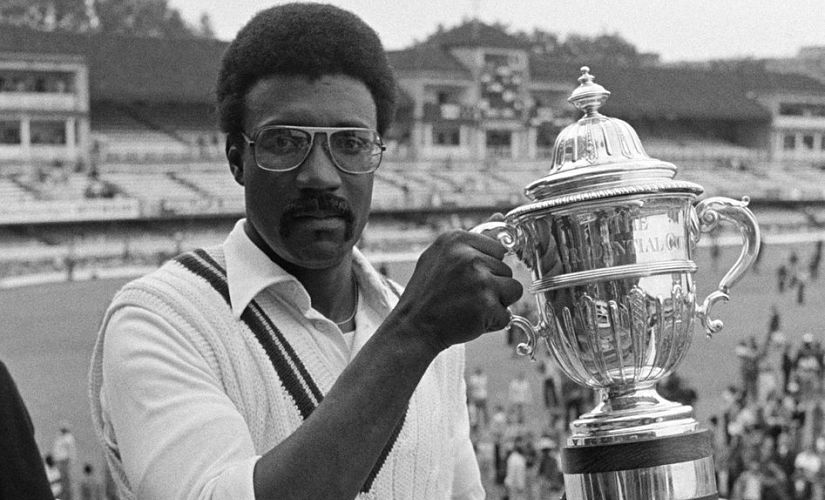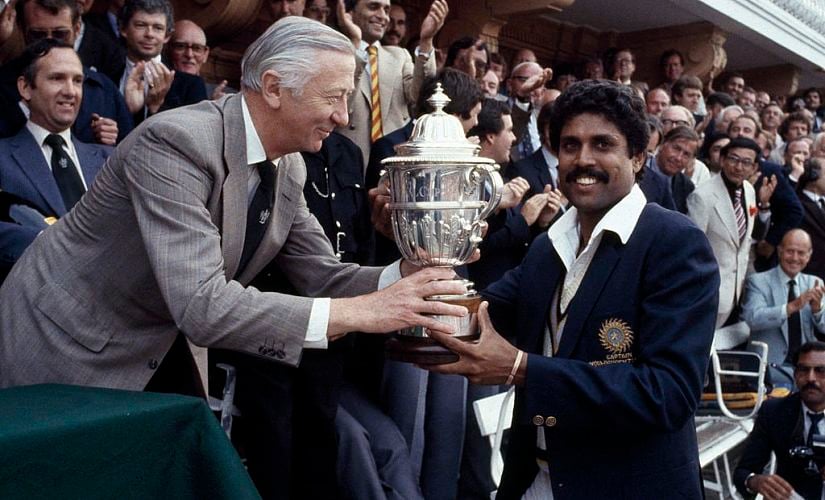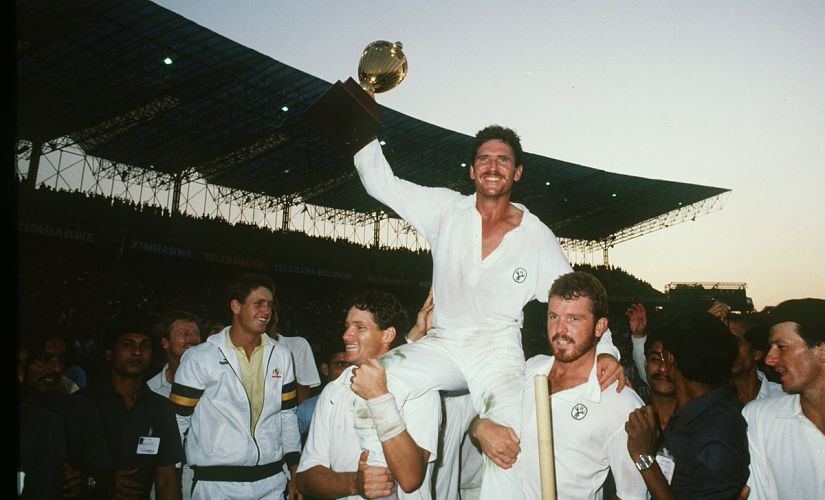It’s time. Well, almost.
The countdown is very nearly into extra time, and the stage is set for the 13th edition of the mega event.
World Cup 2023: News | Schedule | Results | Points table
Since its inception in 1975, the ICC Cricket World Cup has served as the showpiece event of the gentleman’s game. Drama, delirium, delight, despair – all of it has co-existed to provide a lifetime’s worth of everything that makes the sport so cherished to those witnessing it.
As the cricketing world descends upon India, we are taking a look back at the history of the World Cup.
In the first chapter of this three-part series, we chart the origin story. Here’s looking back at the first four editions of the ICC World Cup, before coloured clothing came into its existence.
1975: The start of something special
7 June 1975. The day cricket took the biggest step of its then nearly 100-year old history. The Prudential Cup, as the World Cup was called in its first three editions, was ICC’s move to begin to rival the popularity of the bigger sports around the world, and while the game almost shot itself in the foot in the opening act (which we will be talking about later in the piece), the 15-day event did enough to initiate a revolution.
The Format
Eight participating teams (six Test-playing teams, leading Associate nation, and, for the only time, East Africa) were split in two groups of four each. Teams in a group would face each other once, with the top two progressing to the semi-finals.
The Winners
West Indies were crowned inaugural world champions of cricket after maintaining a 100 percent record through the campaign. They trounced Sri Lanka, scraped through Pakistan and eased past Australia in the group stage, before proving too strong for New Zealand in the semis.

The first-ever World Cup final saw a captain rise to the occasion and seize it spectacularly; it would set a theme that’s been followed in several World Cup finals since. The West Indians were precariously placed at 50/3, but Clive Lloyd struck a peerless 102 off 85 balls – very fast for the time – to lift his team to 291/8. Five run-outs, and a Keith Boyce four-for, ensured the Australian reply never gathered steam, and Ian Chappell’s men were bowled out for 274.
The Stars
Glenn Turner and Dennis Amiss – both centurions on the opening day of World Cup action – would lead the run-scoring charts with 333 and 243 runs, respectively. Among the bowlers, Gary Gilmour featured only in the final two games of the Aussie campaign – but 6/14 in the semi-final against England, followed by 5/48 in the loss to West Indies, meant he ended top of the pile with 11 wickets (at a scarcely believable average of 5.63).
The Bizarre
One wanted the World Cup to provide pace to the traditionally slow narrative of the sport, and the first half of the first game did just that, as Dennis Amiss’ century propelled England to 334/4 against India – comfortably the highest total in ODIs at the time. India’s response was led by Sunil Gavaskar, who didn’t quite read into the situation, turning it into one of his iconic Test match dead-bats. The Little Master batted through the innings, facing 174 balls – scoring 36. India finished their 60 overs with 132/3, and with their own supporters protesting against them.
The Game
Barely a handful of the 15 matches were tight affairs, but Pakistan ran the to-be champions very close in the group stage. In reply to 266/7, built around half-centuries from Majid Khan, Wasim Raja and Mushtaq Mohammad, the West Indians seemed in trouble at 99/5, in further strife at 151/7, and gone for all money at 203/9. But the seemingly impossible happened through a then-record 64-run stand for the tenth wicket; ‘keeper Deryck Murray’s 61 not out was the headline act, but it couldn’t have been without an unbeaten 24 from number 11 Andy Roberts – one of only three instances of the feared fast bowler scoring more than 20 in an ODI.
***
1979: Caribbean command, again
Four years later, much of the World Cup remained the same. The venue, the format, all but one of the participating teams, and the champion – all – stayed the same as in 1975. But the game’s growth was reflected in a higher number of closer contests, and Pakistan’s journey to the semis, at the expense of 1975 runners-up Australia.
The Format
Exactly the same as the first edition, with Canada replacing East Africa as the team to qualify alongside Sri Lanka from the ICC Trophy. East Africa’s absence meant this was, and remains, the only edition not to feature any representation from the African continent.
The Winners
The West Indian domination continued at the world stage, with the all-conquering Caribbean army rolling into its peak gear; Haynes, Greenidge and a certain Vivian Richards ruled the batting roost of the time, while the fearsome pace attack had all of its generation-definers barring Malcolm Marshall. They may not have been able to repeat their five-wins-in-five act of ’75 due to an abandoned rubber against Sri Lanka, but they registered a few thrashings – including in the final.
The Final
A thoroughly one-sided affair, thanks to the efforts of a King and ‘the’ King. England were happy when the holders were 99/4 with their captain back in the hut, but Viv Richards would bat through with a majestic unbeaten 138 – and that knock would be the second best on the day, because Collis King smoked a game-changing 86 off 66 balls. West Indies ended with 286/9, and while fifties from Mike Brearley and Geoffrey Boycott gave the illusion of a fight, they batted so slow that Clive Lloyd, allegedly, dropped Boycott ‘on purpose’. The hosts were eventually bowled out for 194.

The Stars
The batting charts were dominated by the Caribbean top-order; Gordon Greenidge amassed 253 from four outings, while Richards’ final burst took him to 217. Graham Gooch, playing his first World Cup, was third on the list. But an Englishman did top the bowling grades – Mike Hendrick finished with 10 wickets, ahead of New Zealand’s Brian McKechnie, Pakistan’s Asif Iqbal and fellow countryman Chris Old, all of whom ended on nine.
The Bizarre
If Canada were hoping to take cricket to the Americas, their dream unraveled quite sensationally. Scores of 139 against Pakistan and 105 against Australia were poor enough, but they were sandwiched by the darkest hour. The Canadians were rolled over for 45 by England; it would remain the lowest at the World Cup until another batch from the Maple land sank further in 2003.
The Game
The final clash in Group A wasn’t of any qualification consequence, with both England and Pakistan having secured their semi-final berths. The English batsmen didn’t appear to take it too seriously, and only an enterprising 24 from Bob Willis at number 10 took them to 165/9. Mike Hendrick, however, razed the Pakistan top-order as they subsided to 34/6 – only for a 51 from Asif Iqbal to get the game going again. Two late wickets from Geoff Boycott, of all people, would help the hosts complete a 14-run win, that helped them top the group – and avoid West Indies in the semis.
***
1983: The Birth of a Nation
It may sound hyperbolic, but let’s face it: Indian cricket would not have been the same had it not been for the events of the English summer of ’83. And by extension, one would daresay, cricket in itself would not have been the same either. It’s easy to see it from the prism of the champions all these years later, but the success of the 1983 World Cup went beyond India – it was a campaign that gave wings to the entire subcontinent, and eventually ensured that the game’s founders didn’t remain its sole power-centers.
The Format
The same, with an extension to the tournament. Instead of facing each other once, all teams would play each other twice in the group stage, taking the number of matches up from 15 to 27. Zimbabwe took Canada’s spot as winners of the ICC Trophy.
The Winners
India. 66/1, according to the bookmakers, at the start of the event. One win in six World Cup games prior to 1983. No win against West Indies, not a single win against England in England. But all of that – all of history – was to be rewritten.
A precursor to the final act was set in the opening game itself, with victory over the reigning champions (the first time West Indies had lost a World Cup match). A few games later, with the tournament on the line, came a once-in-a-generation effort versus Zimbabwe (more on that below). Then a win over Australia to make the knockouts, and then that elusive win over England in England. And then…

The Final
183 all out in the final against the team that had played – and won – both the previous finals of the competition, at the same venue. Then, the chasing team race to 50/1, with their ‘King’ motoring about. One ball is hit high up in the air.
Kapil Dev runs. He runs, he runs some more, and he changes the course of Indian cricket history. West Indies, in a state of shock almost, are bowled out for 140. Lord’s becomes an Indian colony. India are champions of the world.
The Stars
England, on the back of a rather high-scoring campaign, had two of the top three run-getters for the tournament; David Gower caressed his way to 384 runs in seven games, while Graeme Fowler struck 360. Between them was Viv Richards, who hit 367. The bowling ranks were topped by the military medium duo from the champions’ camp – Roger Binny claimed 18 strikes in eight outings, while Madan Lal, with 17, was tied-second with Sri Lankan Ashantha de Mel.
The Bizarre
India vs Zimbabwe, Tunbridge Wells. Surely you’ve heard about it?
In a must-win game, India were 9/4, and then 17/5, after having opted to bat first. In walked their captain, to play a tournament and career-defining innings. From 17/5, Kapil Dev smashed an unbeaten 175, blasting 65.78% out of India’s total score of 266/8 (still the second-highest contribution by a batsman in a completed ODI innings). Kapil’s ‘Devils’ never looked back.
The Game
That India-Zimbabwe tie ranks among the best games in World Cup history, but the Zimbabweans merit their own place for what was a highly spirited maiden appearance at the global stage. In their very first game, they claimed a hard-fought 13-run win over Australia. Duncan Fletcher – who would come to be known more popularly as a coach a few decades later – arrested a batting collapse with a 69 not out as Zimbabwe posted 239/6, and then took 4/42 to initiate a slide from 114/2 to 176/7, that the Aussies couldn’t recover from.
***
1987: Putting the ‘World’ in the Cup
In its first three editions, the World Cup had grown immensely, building the value of the sport. By the mid-80s, the game had expanded, and didn’t need to be played out solely from its ‘home’. And so, the World Cup moved out of England, and headed to the subcontinent. The increased number of ‘thrillers’ would pave the way for further revolution in the years ahead; as many as eight games, including the final, were decided by less than 20 runs, with two more being won by a margin of two wickets or lesser.
The Format
The tournament format, as well as participating teams, stayed the same as in 1983. This would, however, be the last time that the World Cup was played using a red ball, and wearing all-whites.
The Winners
They would come to be known as the ultimate giants of the competition, but it took Australia a while to get off the mark. Having failed to go the distance the first three times, the Aussies finally did so, losing just once in eight matches. They bossed the nervy finishes – three of Australia’s wins came by margins of seven runs or below. Australia finished a narrow second to India in the group stage, but proved second to none in the business end, edging out Pakistan in the semis and the oldest rival in the final.

The Final
12 years after its inception, and into its fourth edition, the World Cup finally got the Old Firm final. Australia versus England, at a 120,000-capacity Eden Gardens – and it lived up to it. Man of the Final David Boon’s 75 formed the backbone of Australia’s 253/5, although Mike Veletta’s 31-ball 45 not out was priceless in the final calculation. But England were coasting to the title at 135/2, when, perhaps out of desperation, captain Allan Border brought himself into the attack. A well-set Mike Gatting, known for his traditional ways, attempted a reverse sweep off the first ball. He fell, England crumbled – and a 23-year-old Steve Waugh stayed ice-cool in the finish to seal a seven-run victory.
The Stars
The two finalists made the bulk of the top aggregators, despite playing in the perceived tough climes of Asia. Graham Gooch’s tally of 471 runs kept him clear of Aussie duo David Boon (447) and Geoff Marsh (428). Craig McDermott was the leading wicket-taker with a haul of 18 (including five in the semis vs Pakistan), although Imran Khan ran him close with 17 strikes in seven games.
The Bizarre
West Indies, for the first time, failed to make the knockout stage of the World Cup – and it may have been down to the greatest act of sportsmanship witnessed in the event’s history. In the first of their two group meetings with Pakistan, played at Lahore, West Indies were well on top with the hosts needing 14 to win in the final over with their last pair at the crease. Abdul Qadir, with Saleem Jaffar for company, brought that equation down to two off the last ball. Courtney Walsh pulled out of his delivery stride with Jaffar having strolled well out of the crease at the non-striker’s end – but instead of dislodging the bails, Walsh let Jaffar off with a ‘warning’. Qadir scored the required runs of the eventual final delivery; had West Indies won the game, they would have qualified at the expense of Pakistan.
The Game
A tournament filled with nerve-wracking finishes, but none as close as its first. On the second day of action, India fronted up to Australia at Chepauk – venue of the famed ‘Tied Test’ from just a year earlier. Australia’s 270/6, built around Geoff Marsh’s 110, didn’t seem to be enough when Navjot Singh Sidhu and Kris Srikkanth had led India to 202/2 going into the final 15 overs. But Craig McDermott applied the brakes, and Steve Waugh was at hand to deliver the chokehold. Just like the Tied Test, Maninder Singh was involved in the final act, this time seeing his stumps broken by Waugh as the Aussies eked out a one-run win with a ball to spare.
from Firstpost Sports Latest News https://ift.tt/dEzw4ai
No comments:
Post a Comment